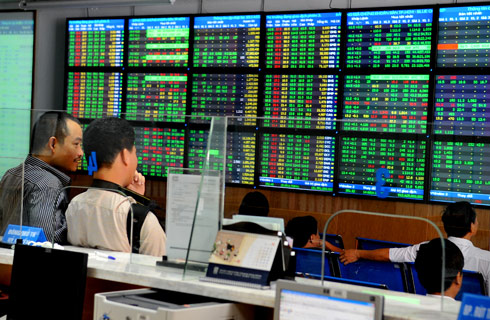Viet Nam’s benchmark VN-Index has climbed to the highest level in three weeks but analysts have warned positive market sentiment may not last in the coming week.

Viet Nam’s benchmark VN-Index has climbed to the highest level in three weeks but analysts have warned positive market sentiment may not last in the coming week.
The VN-Index on the Ho Chi Minh Stock Exchange on Friday gained 1.14 per cent to finish last week at 987.22 points, the highest end since August 23.
The VN-Index made a weekly gain of 1.35 per cent.
Investors are expecting the benchmark will reach its previous peak of 1,000 points soon. But analysts warn the scenario won’t be realised in the coming days.
The Vietnamese stock market did not match global stocks, which advanced strongly on the softer stance of the US and China towards their trade relations, specialist Nguyen Huu Binh said.
What really drove local shares last week were individual companies’ business news and the State Bank of Viet Nam’s statement on cutting lending rates, which is seen as a move to match other central banks’ policies and boost the domestic economy.
Last week, technology firms, retailers and banks were among the biggest gainers that took turns giving the market a boost.
According to Binh, central banks are seeking ways to stimulate their economies and one of the ways is to cut lending rates to encourage domestic businesses and people to borrow more and spend more.
The Vietnamese central bank has decided to intervene in the monetary market as the Vietnamese dong has got stronger since the beginning of the year, putting pressure on the country’s exports.
“Tightened credit policy and stricter capital control are two of the reasons that have made Vietnamese shares less attractive so far this year,” Binh told tinnhanhchungkhoan.vn.
“In the coming months, some banks will get the green light to raise their lending limits,” he said.
“However, it (the lending rate cut policy) will take some time to really have an impact on the Vietnamese economy, so investors will correct themselves from being too excited.”
The local stock market will keep rising this week, but the growth isn’t as strong as expected and there will differentiation between different groups of stocks, he said, adding the market will soon encounter strong profit-taking pressure.
Investors might overreact on the weekend because they thought they would get an injection from banks following the central bank’s statement, director of the Viet Dragon Securities Corp (VDSC)'s individual investors department Hoang Thach Lan said.
The latest statement would lift bank stocks while other sectors hardly have any support, he said.
But the market growth would be short-lived and it may end if investors are struck with bad news from the international market, he warned. “It doesn’t mean capital injection.”
What will really matter now is the trading liquidity, specialist Binh said. “If trading volume does not increase, it means investors haven’t got a capital boost yet.”
Average trading volume on the Ho Chi Minh Stock Exchange last week reached 119 million shares each day, up 1.5 per cent on a weekly basis.
The rate cut policy will not have a big impact on Viet Nam like it often does in other developed economies, according to Tran Duc Anh, director of macro-economics and market strategy at KB Securities Vietnam Co (KBSV).
Viet Nam’s central bank attempts to control the volume of cash supply through lending and payment methods while European and American central banks use lending rates to keep control of the cash supply, Anh explained.
Therefore, the latest announcement of the SBV is only mentally effective and it will take more time to see if the policy really has an impact on the country’s cash supply, he said.
Foreign capital returns
Foreign capital may return to the Vietnamese equity market in the next quarter after they have net-sold local assets in recent months, analysts have said.
Foreign investors net-sold VND1.6 trillion (US$68.7 million) worth of local shares in August – the strongest since the beginning of the year. Meanwhile, investors have withdrawn their money from exchange-traded funds (ETFs) since January.
But during the eight-month period, local investors have helped absorbed a part of foreign selling to keep the market from falling sharply. According to analysts, Viet Nam was the least hit by foreign selling among all Asian markets.
According to Matthew Smith, director of research and analysis at Yuanta Vietnam Securities Co, the volatility and risk of global markets and economies have forced investors to seek safe assets like gold and silver, and they are running away from emerging markets.
But foreign investors may return to the Vietnamese market as they get boosted by central banks’ lending rate cuts, which provide them with a bigger wallet. Many investment funds are holding onto a big volume of cash, so they need a trusted destination to spend that money, and Viet Nam is the trusted destination.
In addition, the development of new indices focusing on foreign-ownership-capped firms will help foreign investors filter the companies that they are interested in. — VNS





